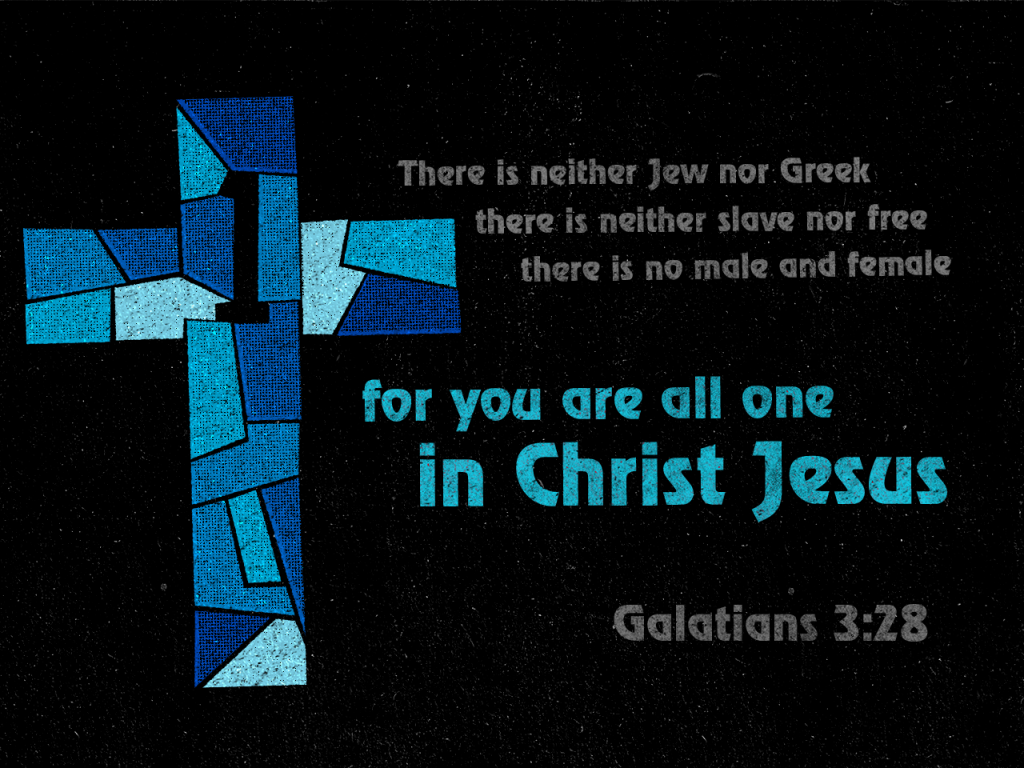Faithlife Study Bible (FSB) is your guide to the ancient world of the Old and New Testaments, with study notes and articles that draw from a wide range of academic research. FSB helps you learn how to think about interpretation methods and issues so that you can gain a deeper understanding of the text.
3:28 neither Greek or Jew Paul emphasizes that the standard categories that often divide people—race, social status, gender—do not apply to those who are in Christ. It is not that such criteria cease to exist; rather, these distinctions are not grounds for exclusion from the life that God offers to all people in Christ. Because God is one (v. 20), He seeks to establish through Christ a single, unified family.
Barry, J. D., Mangum, D., Brown, D. R., Heiser, M. S., Custis, M., Ritzema, E., Whitehead, M. M., Grigoni, M. R., & Bomar, D. (2012, 2016). Faithlife Study Bible (Ga 3:28). Lexham Press.
The Lexham Research Commentary is your starting point for study and research. It surveys all the relevant literature on a passage and brings the summary back to you. This guide summarizes a broad range of views on a particular passage—views you may or may not agree with, but in all cases, views you will encounter as you critically study the text
One in Christ Jesus
At the end of his lengthy debate about the law and the promises of God in Gal 3:6–22, Paul ties together the strands of his argument by describing the true heirs of Abraham as those who are God’s children by faith and are baptized into Christ (Gal 3:26–27).
Then, in Galatians 3:28–29, Paul makes one of the most remarkable statements on Christian unity in the nt. Crossing theological lines into the realm of social relationships, Paul announces the direct result of the blessings promised to Abraham coming to all people through the one seed, Christ: “There is neither Jew nor Greek, there is neither slave nor free, there is neither male and female, for you are all one in Christ Jesus” (Gal 3:28).
Two major questions concerning this verse feature in commentaries. First, in what sense—or to what extent—does Paul think the social relationships mentioned in Gal 3:28 no longer exist? Second, what does it mean for all believers to be “one” (heis) in Christ Jesus?
• Bruce argues that Paul’s law-free gospel places Jews and Gentiles on the same level before God. As a result, the distinctives of the pairs in Gal 3:28 have been erased for a new identity in Christ, though a certain degree of (social) inequality is not ruled out. Bruce also views the notion of “oneness” in Gal 3:28 in light of Rom 12:5 and 1 Cor 10:17, where Paul speaks of the “one body” of Christ. “Galatians 3:28” The New International Greek Testament Commentary: The Epistle to the Galatians
• Dunn rightly notes that the Jew-Gentile dichotomy and divisions based on slavery and gender represented the fundamental divisions among humanity for the Jews of Paul’s day. Paul’s language therefore implies a “radically reshaped social world” within the Christian worldview.
It’s not that these distinctions have been removed, but that they have been “relativized” where they no longer have significance before God. Instead, all believers—whether Jew, Gentile, male, female, slave, or free—are God’s children through the one faith. “Galatians 3:28” Black’s New Testament Commentary: The Epistle to the Galatians
• Martyn regards Galatians 3:26–29 as a baptismal formula from early Christian liturgy (compare 1 Cor 12:13; Col 3:9–11). According to Martyn, God’s new creation—“the eschatological novum”—serves as the basis of the new oneness of God’s people in Christ, who are no longer defined simply in terms of the social pairs mentioned in Gal 3:28. These social pairs belong to the old order. “Galatians 3:26–29” Anchor Yale Bible: Galatians
• Schreiner cautions against interpreting Gal 3:28 to mean the end of all social distinctions. According to Schreiner, Paul means that being in Christ—belonging to the family of Abraham (Gal 3:26, 29)—means that God’s people should not be “marked by social classes and cliques.” “Galatians 3:28” Zondervan Exegetical Commentary on the New Testament: Galatians
• In his social-rhetorical commentary, Witherington engages the issue of why Paul, in referring to the male-female pair, uses the conjunctive kai (“and”) rather than oude (“or”). Whereas most believe Paul was following the wording of the Septuagint in Gen 1:17, Witherington puts forward the unusual argument that Paul here is addressing the Galatians adoption of a nomistic lifestyle and its implications for gender inequality. “Galatians 3:28” Grace in Galatia: A Commentary on Paul’s Letter to the Galatians
Mangum, D., & Brown, D. R. (2012). Galatians (Ga 3:1–4:7). Lexham Press.


